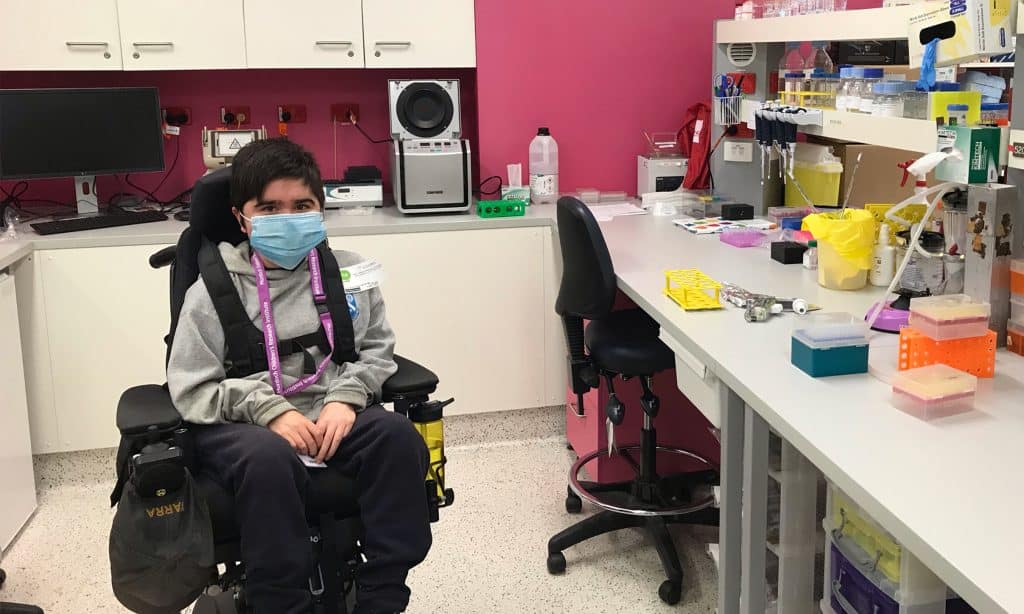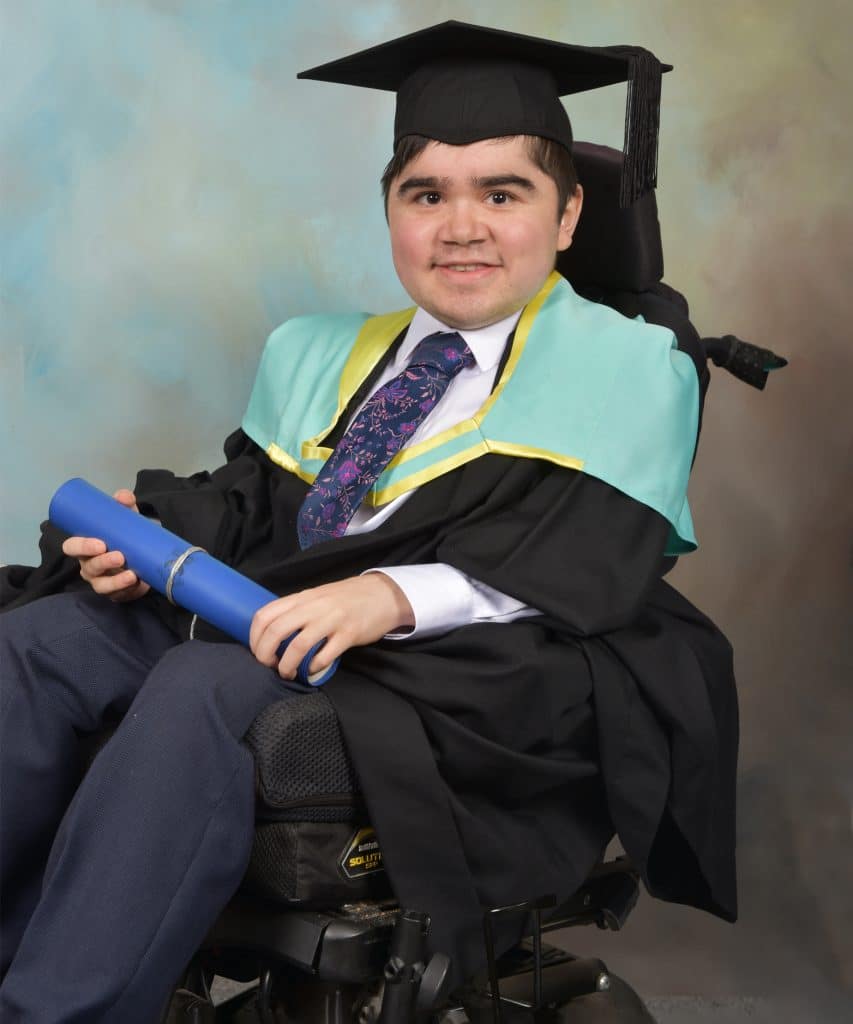
8 November 2022
As we continue our series on younger Christian scientists and their science-faith journeys, Executive Director Chris Mulherin, at ISCAST – Christians in Science and Technology, speaks with David MacPherson about his experience with Duchenne muscular dystrophy and his passion for science.
CHRIS: Hi David, it’s great that you’re happy to talk to us. I wonder if you’d introduce yourself briefly.
DAVID: Yeah, I’ve just completed four years at Monash University studying genetics and biochemistry and I’m looking forward to a PhD in genetics next year – I’m very passionate about science. I have Duchenne muscular dystrophy, a sex-linked male disease. For fun, I enjoy playing weekly wheelchair soccer.
CHRIS: Could you tell us a bit more about Duchenne muscular dystrophy?
DAVID: It’s a genetic disease that you’re born with. It can be inherited from the mother’s side, or it can be a random mutation. It mainly affects about one in 5000 boys worldwide. As a medic, Mum was observing my movements from a very young age, thinking something wasn’t quite right. I was diagnosed when I was about five.
CHRIS: And what does the future hold?
DAVID: In the past you wouldn’t survive much past your 20s, but now the prognosis for DMD is much better – I for one am 23! Better physiotherapy and steroid medication help maintain muscle longevity. These days there are people with DMD living into their 40s.
CHRIS: Tell us a bit more now about your science. You’re a young scientist with a genetic disease, going into a PhD in genetics. In your PhD, are you doing something personal there?
DAVID: You could say my motivation for exploring genetics is, in part, through my firsthand experience of what genetic mutations can cause. For a PhD, you need to do something that you’re passionate about, so a project on DMD would be a great motivator. PhD students have warned me that when the hard slogging of the project hits, you want to be able to say, “Yes, I still want to do this!” Monash Uni’s disability student services will fund someone to be a lab assistant. They will be the hands and I’m the brain, so by and large I’ll be the one directing.

CHRIS: So how did you become interested in science?
DAVID: At high school I had a really great chemistry teacher – he was interesting, fun, and good at answering questions. I found myself enjoying this chemistry stuff where other people would say, “Oh, I hate this”! Then into university I became intrigued by the genetic code, “So let’s give genetics a go,” I decided.
CHRIS: Let me ask about your Christian faith. You’ve grown up in a Christian family, have you always been a Christian or do you see it as something that at some point you took hold of personally?
DAVID: In early high school it clicked that I was pursuing faith myself rather than through my parents. I was reading apologetics and wrestling with questions like, “Has this Christian thing got some truth?” “Do I really believe it?” I never had any sense that God wasn’t real, but my faith needed to become personal.
CHRIS: Did you have to work through whether or not science challenged your faith?
Read more: ‘We care for the planet as the right response to a loving creator’
DAVID: Probably a little at the early stages. I would ask, “Are there certain things about Christianity that I can’t believe anymore?” I discovered that people like CS Lewis and many other Christian writers had tackled well these issues. I started to see that science and God work well together and that encouraged me more in my faith.
CHRIS: You obviously love science. How, as a Christian, do you understand the scientific enterprise?
DAVID: Science for me is exploring the wonderful creation of God and seeing the amazing, intricate things that happen at such a tiny molecular level. And I think, “Wow, isn’t this creation amazing!” In this way, there’s no conflict with science and God, it’s actually a beautiful partnership.
But I’ve found science can’t answer the harder existential questions, the sort of questions you have when you have a disability like mine, and you have to consider your lifespan.
CHRIS: Can you tell us more about those existential issues if you’re happy to?
DAVID: More than the challenge of questions in science has been working out God’s goodness towards me. I went through a phase of being angry at God and had many questions: “Why am I born with this disease that’ll shorten my life?” “Could God love me if he allows me to be born with this?” “Does my life have any meaning if it’s going to be shorter?” “How could you, God, let this happen to me? I’ve done nothing wrong”. In my case DMD didn’t even run in my family, it was just a random mutation. A bit like Job, I wondered, “Where, where are you God in allowing this to happen?”. So, I didn’t want to be friends with him at all at times.
But slowly, God turned me towards him. I realised my identity is in Christ and not in my own body, and whatever happened I could trust that God had a better plan for me. All this took a good while, but God got me through by his grace in the end.
CHRIS: So, what would you say to somebody who says, “Well I couldn’t possibly believe there’s a good God because I’m in a wheelchair, I have a short life expectancy.”?
Read more: ‘It’s not about what success I’m having … it’s about who God says I am’
DAVID: It’s a very tough question and a very personal one. For me, the most reassuring thought is that for us as Christians this life on earth is a very short stop on the way to our proper home. Paul says, “Our sufferings here will be nothing compared to the glory we see with God”. There might be suffering now but in the end he will get rid of it. I would also encourage others to explore how God, on the cross, has been through pain at a deep, personal level.
CHRIS: You talked before about wrestling with wanting God’s friendship. Have you been through other types of questioning times?
DAVID: Having a progressive disease means you always have some days where you think, “Oh, I wish I could do this or that”. I love watching sport but sometimes I wish I could do the sport. Playing wheelchair soccer has resolved some of that wistfulness. And then other general things in life that someone like me can’t do, like driving a car. It’s only human to have a down day; that’s where faith in God keeps you going and, for me, gives me a great hope and joy in my life that I don’t think I could have without God.
CHRIS: Have other people in your life encouraged you?
DAVID: I’ve been seeing the same doctor since I was about five. He’s been very supportive of my studies and always interested in how I’m going. It’s been great to have continual medical care with the same person who’s got to know me as an individual. And my parents have been brilliant at supporting me at home and caring for me from day to day and helping me get up and get ready for the day. And I have two really caring sisters as well.
CHRIS: Well David, it’s been really interesting and encouraging talking to you. I hope it can encourage others, too. Thank you so much for being willing to share about your personal situation; it’s something that many people might not have wanted to do.
DAVID: Oh, thank you for having me. It’s been a pleasure.
For more faith news, follow The Melbourne Anglican on Facebook, Twitter, or subscribe to our weekly emails.







